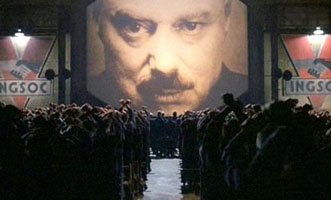“It was a bright cold day in April, and the clocks were striking thirteen” – Thus starts George Orwell’s dystopian novel, 1984, set 30 years ago this April.
Orwell’s work tackles issues still relevent today, from the dangers of a totalitarian state and concerns around surveillance, to rebellion against a regime at high personal risk, and even more basic human emotions such as love and betrayal.
The Language
Many expressions coined by Orwell are now part of our common lexicon. Asked which words or phrases they had heard used or used themselves, the majority (63%) of Americans had heard or used the term Big Brother, one in three (34%) were aware of the term thought police and one in four (24%) of Newspeak.
In all, two-thirds of the American public is aware of at least one word or phrase popularized by Orwell. This is higher among men (75%), those aged 55 or over (80%) and those with a post-graduate education (85%). Perhaps unsurprisingly, Americans who had read 1984 were more aware of at least one words or phrase (89%). 91% of those who had seen the movie starring John Hurt and Richard Burton, and released in 1984, were aware of an Orwellian expression.
Which of the following words or phrases have you either heard used or used yourself?
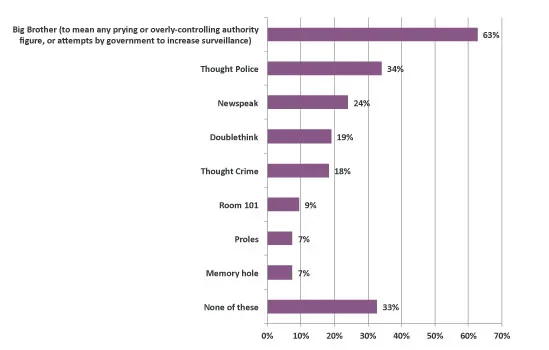
Base: All US adults (1,113)
Constant Surveillance and Perpetual War
In the novel a continual war plays out between three super states – Oceania, Eurasia and Eastasia. This perpetual war is deliberately maintained in order to keep the people of each nation subdued and to enforce a class system with few elites.
One in three (33%) Americans agreed with the following statement: “The US Government is always at war as a way to keep people subdued and unequal with each other”. Men are more likely to see this theme as something true in today’s society (41% compared with 25% of women), as are those aged 18 to 34 (37% compared with 29% of those aged 55 or over). Agreement is twice as high among those with a high school education compared against those with a post graduate education (36% compared with 18%).
Orwell talks of a society in which citizens’ movements, actions and reactions are closely monitored using telescreens which have a view of most private spaces in a person’s home and in public places. These are used to arrest and imprison anyone who acts against the regime.
Surveillance has become a conversation of discussion in real life recently with the NSA leaks. Indeed, when news of NSA’s PRISM program were leaked, sales of one edition of the book increased by 7,000% on Amazon. Two in three (62%) agreed that “The US government uses our personal electronic devices, such as smartphones, computers and televisions, to track what we are doing and spy on us”, in fact just one in eight (16%) disagreed leaving 22% of people who remained neutral.
Men are again more likely to agree (69% compared with 54% of women) but agreement remains level among different age groups and education levels. Interestingly, parents of children aged under 18 are also more likely to agree (68% compared with 60% of those without).
To what extent do you agree or disagree with the following statements?
Base: All US adults (1,113)
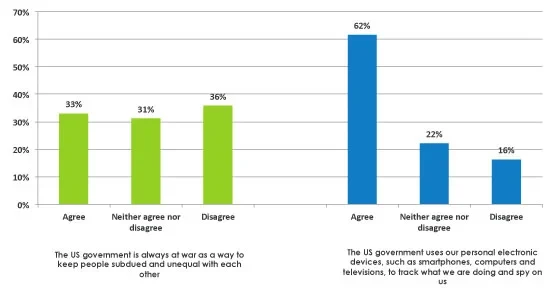
George Orwell
George Orwell, real name Eric Arthur Blair, was a British author who lived from 1903 to 1950. While Nineteen-eighty four (written in 1949) is possibly his most well-known work, others include the allegorical novella, Animal Farm, written five years prior.
Awareness of Orwell remains high in the US. Indeed three in five (59%) people recognize the name of the writer. This rises to two in three (65%) men, three in four (73%) of those aged 55 or over and a huge 92% of those with a post-graduate education.
Those aware of George Orwell (British author, 1903 – 1950) by gender, age and education level
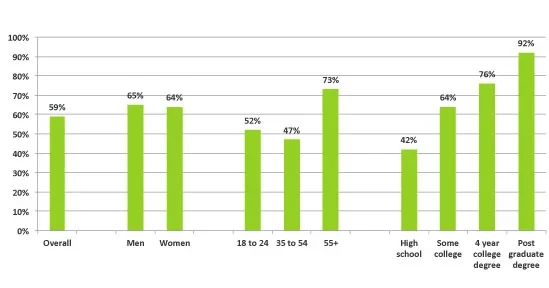
Base: All US adults (1,113)
Orwell’s personal politics were always left leaning despite being a strong critic of communism. He is widely described as a democratic socialist. Those aware of Orwell were asked which words or phrases they felt described his politics. Half (46%) did not know, but of those who gave an answer 43% state socialist, 35% liberal and 29% democratic. Around one in eight interpret him, perhaps incorrectly, as being totalitarian (14%), conservative (13%) or communist (12%).
Nineteen-eighty four
More than one-third of a million copies of nineteen-eighty four were sold in US alone in the first 12 months after it launched, and its popularity continues today. Over half (54%) of adults in the US are aware of the novel. As with Orwell himself, awareness is higher among men (61% compared with 48% of women), those aged 55 or over (65%) and those educated to post-graduate levels (86%).
Of those aware of the novel, two in three (66%) have read it – equating to 37% of the US population.- and 18% of the population has seen the 1984 film starring John Hurt and Richard Burton. Incidences of both are again higher in men (42% have read the book, 24% seen the film); those aged 55 and over (44% and 22% respectively); and those with a post-graduate education (65% and 29%).
While inspired by title only, the television show Big Brother, in which house guests live together whilst their activities are constantly monitored on- cameras, is recognized by two in three (64%) Americans.
Fewer Americans have watched Big Brother than have read the Orwell novel with just under one in three (31%) Americans having watched the show.
Which of the following have you ever seen or read?
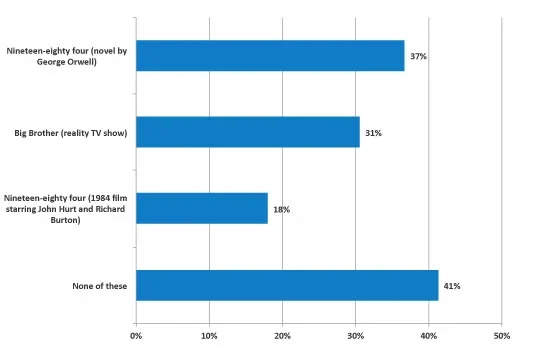
Base: All US adults (1,113)
For further information about poll results, and for details about methodology and omnibus services, please email omnibus.us@yougov.com.
Find the full results here.
Image courtesy of Getty.
